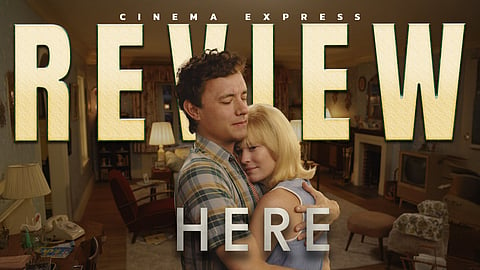Here Movie Review: An ambitious filmmaking experiment sans emotional resonance
Here(2 / 5)
Watching Robert Zemeckis’ Here is like revisiting a big old family album, dusting it off, and flipping through its pages with a childlike curiosity. You may feel some momentary comfort in the familiar, a sense of nostalgia even. But gradually, you will also feel an emotional distance from the characters in the photographs and their respective stories. A film that revolves around the passage of time and explores the enduring power of human connection should elicit deeper emotional resonance, which Here, unfortunately, fails to achieve. None of the characters register, mainly because Zemeckis flips between timelines and tries to cover too much ground in too little time.
Here tells an ambitious story spanning multiple generations, dating way back to the prehistoric period. In a unique filmmaking and storytelling choice, Zemeckis uses only a static angle. But the characters go in and out of the frame as if on a whim; the camera never follows them, creating a lingering sense of detachment, resulting in a bizarre output. Zemeckis also cuts abruptly from one scene involving one set of characters to another in a different timeline, sometimes in the middle of a conversation. This pattern continues to a great degree until the appearance of the younger versions of Tom Hanks and Robin Wright. It comes across as a mere storytelling gimmick, making it difficult to relate to the characters and their stories. The static framing occasionally creates a stage play effect as well, as characters seem to address the viewer directly.
Director: Robert Zemeckis
Cast: Tom Hanks, Robin Wright, Paul Bettany, Kelly Reilly, Michelle Dockery
The film focuses on various families who inhabit the same piece of real estate over time, but it also delves into the broader cosmic and geological history of the location. It uses time-lapse shots and a nonlinear narrative to show the vast expanse of time that elapses on this particular piece of land, maybe to emphasise the fleeting nature of human existence. Presumably, what Zemeckis is trying to do here is show how each life is all but a small blip in the grand scheme of cosmic history. What else do the stretches involving The Big Bang, the Ice Age, the era of dinosaurs, and an indigenous couple have anything to do with Richard (Hanks) and Margaret (Wright)? The idea is ambitious, but it also comes in the way of the storytelling. The camera angle, then, perhaps symbolises how real estate remains the constant factor even as everything changes around it, bearing witness to the evolution of life. This is just a theory, by the way. You cannot be sure because Zemeckis' frantic and fragmented storytelling neither gives us time to process the story nor allows the characters to breathe.
A more easily decipherable aspect is the recurring motifs of love, loss, joy, and sorrow that explore the cyclical nature of human experience. History repeats itself as generations across timelines experience the same emotions and challenges. By juxtaposing these disparate time periods, Zemeckis invites us to contemplate the vastness of time, the fragility of life, and the enduring power of human connection. Once again, it is an idea that appears intriguing on paper alone.
In terms of execution, however, Here is a crushing disappointment from the maker of classics such as Who Framed Roger Rabbit, Back to the Future, Forrest Gump, Contact, and Cast Away. It is a filmmaking experiment rather than a cohesive story with well-rounded characters. Even as an experiment, there is very little novelty in it. There are odd choices of product placement in the film that sometimes render it a TV commercial-like quality. In the individual stories, Paul Bettany and Tom Hanks bring whatever little emotional heft to their roles of caring fathers and loving husbands they can.
Apart from some of the humorous exchanges between Hanks’ character Robert and his father Al Young (Bettany), the film has few memorable qualities. To give Zemeckis credit where it is due, he does use the de-ageing technology to a very good effect, bringing back a young Hanks and Wright with much authenticity. But then again, if the point is to watch a young Hanks and Wright all over again, you might as well revisit Forrest Gump.

